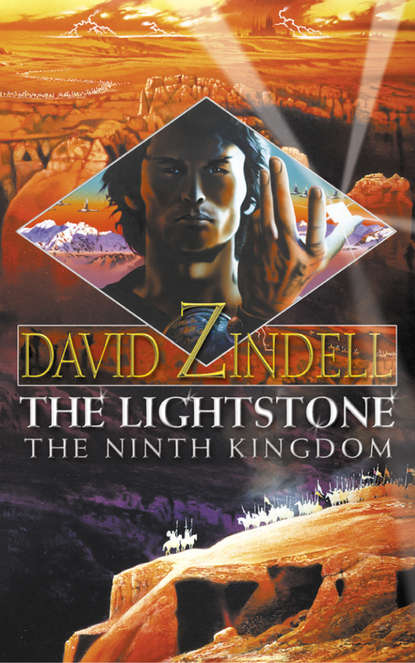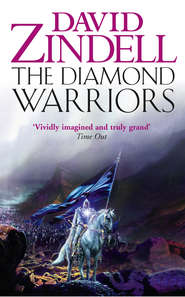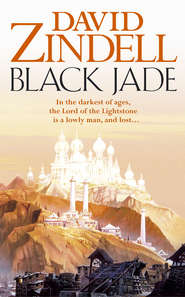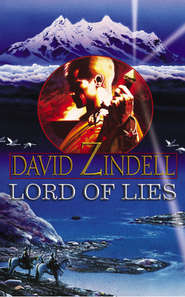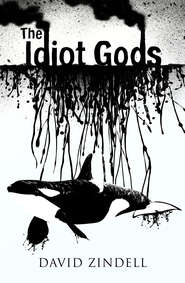По всем вопросам обращайтесь на: info@litportal.ru
(©) 2003-2024.
✖
The Lightstone: The Ninth Kingdom: Part One
Автор
Год написания книги
2019
Настройки чтения
Размер шрифта
Высота строк
Поля
‘Sought it and died,’ I said. ‘No wonder my mother wept for me.’
I went on to tell him that I would most likely be killed far from home, perhaps brought down by a plunging rock in a mountain pass or felled by a robber’s arrow in some dark woods.
‘Do not speak so,’ Master Juwain chastened me.
‘But this whole business,’ I said, ‘seems such a narrow chance.’
‘Perhaps it is, Val. But even a scryer can’t see all chances. Not even Ashtoreth herself can.’
For a while we fell silent as the wind pushed through the valley and the fire crackled within its circles of stones. I thought of Morjin and his master, Angra Mainyu, one of the fallen Galadin who had once made war with Ashtoreth and the other angels and had been imprisoned on a world named Damoom; I thought of this and I shuddered.
To raise my spirits, Maram began singing the epic of Kalkamesh from the Valkariad of the Saganom Elu. Master Juwain kept time by drumming on one of the logs waiting to be burned. So I brought out my flute and took up the song’s boldly defiant melody. I played to the wind and earth, and to the valor of this legendary being who had walked into the hell of Argattha to wrest the Lightstone from the Lord of Lies himself. It was a fine thing we did together, making music beneath the stars. My thoughts of death – the stillness of Raldu’s body and the coldness of my own – seemed to vanish like the flames of the fire into the night.
We slept soundly after that on the soft soil of Yushur Kaldad’s field. No bears came to disturb us. It was a splendid night, and I lay on top of my furs wrapped only in my new cloak for warmth. When the sun rose over Mount Eluru the next morning to the crowing of Yushur’s cocks, I felt ready to ride to the end of the world.
And ride we did. After breaking camp, we set out through the richest farmland of the valley. It was a fine spring day with blue skies and abundant sunshine. The road along this part of our journey was as straight and well paved as any in the Morning Mountains. Indeed, my father had always said that good roads make good kingdoms, and he had always gone to considerable pains to maintain his. Both Master Juwain and Maram could ride well, and Maram was tougher than he looked. And so we made excellent progress through the wind-rippled fields.
Around noon, after we had paused for a quick meal and the horses had filled up on some of the sweet green grass that grew along the curbs of the road, the country began to change. Toward the northern end of the Valley of the Swans, the terrain grew hillier and the soil more rocky. There were fewer farms and larger stands of trees between them. Here the road wound gently around and through these low hills; it began to rise at an easy grade toward the greater hills and mountains to the north. But still the traveling was easy. By the time the sun had crossed the sky and began dipping down toward the Central Range, we found ourselves at the edge of the forest that blankets the northernmost districts of Mesh. A few more miles would bring us to the town of Ki high in the mountains. And a few miles beyond it, we would cross the pass between Mount Raaskel and Mount Korukel, and go down into Ishka.
We made camp that night above a little stream running down from the mountains. The oak trees above us and the hill behind provided good cover against the wind. Master Juwain, although more knowledgeable than I in most things, allowed me to take the lead in choosing this site. As he admitted, he had little woodcraft or sense of terrain. He was very happy when I returned from the bushes along the stream with many handfuls of raspberries and some mushrooms that I had found. He sliced these last up and layered them with some cheese between slices of bread. Then he roasted the sandwiches over the fire that Maram had made. That night it was much cooler, and we were very glad for the fire as we edged close to it and ate this delicious meal. We listened to the hooting of the owls as they called to each other from the woods, and later, to the wolves howling high in the hills around us. After drinking some of the tea that Master Juwain brewed, we gathered our cloaks around us and fell soundly asleep.
The next morning dawned cloudy and cool. The sun was no more than a pale yellow disk behind sheets of white in the sky. Since I wanted to be well through the pass by nightfall and I was afraid a hard rain might delay us, I encouraged the groggy and lazy Maram to get ready as quickly as he could. The few miles to Ki passed quickly enough, although the road began to rise more steeply as the hills built toward the mountains. Ki itself was a small city of shops, smithies and neat little chalets with steep roofs to keep out the heavy mountain snows that fell all through winter.
One of the feeder streams of the Diamond River ran through the center of the town. Just beyond the bridge across these icy waters, where two large inns stood above the houses, the Kel Road from the east intersected the larger North Road. The Kel Road, as I knew from having traveled it, was one of the marvels of Mesh. It wound through the mountains around the entire perimeter of our kingdom connecting the kel keeps that guarded the passes. There were twenty-two of these high mountain fortresses spaced some twenty miles apart. I had spent a long, lonely winter at one of them watching for an invasion of the Mansurii tribe that never came.
Maram, citing the hard work of the morning (which in truth was mostly the horses’ hard work), argued that we should stop for a few hours and bathe at one of these inns. He grumbled that the two previous nights’ camps had afforded us neither the time nor the opportunity for such vital indulgence. It was almost a sacred ritual that a Valari would wash away the world’s woes at the end of a day, and I wanted a hot bath as badly as he did. But I persuaded him that we should leave Ki behind us as swiftly as possible. Although it was late in the season, it could still snow, as I patiently explained to him. And so, after pausing at the inn only long enough to take a quick meal of fried eggs and porridge, we continued on our journey.
For seven miles between Ki and the kel keep situated near Raaskel and Korukel, the Kel Road ran contiguous with the North Road. Here, as the horses’ hooves strove for purchase against the worn paving stones, the road rose very steeply. Thick walls of oak trees, mixed with elms and birch, pressed the road from either side, forming an archway of green leaves and branches high above it. But after only a few miles, the forest began changing and giving way to stands of aspen and spruce growing at the higher elevations. The mountains rose before us like steps leading to the unseen stars.
In many places, the road cut the sides of these fir-covered foothills like a long, curved scar against the swelling green. I knew that we were drawing close to the pass, although the lower peaks blocked the sight of it. As Maram complained, travel in the mountains was disorienting, and one could easily become lost. He had other fears as well. After I had recounted my conversation with Lansar Raasharu, he wondered aloud who the second assassin might be if he wasn’t one of the Ishkans. Might this unknown man, he asked, stalk us along the road? And if he did, what were we doing venturing into Ishka where he might more easily finish what he had begun in the woods? With every step we took closer to this unfriendly kingdom, these unanswered questions seemed to hang in the air like the cold mist sifting down from the sky.
Around noon, just as we crested a low rise marked with a red standing stone, we had our first clear view of the pass. We stood resting the horses as we gazed out at the masses of Korukel and Raaskel that rose up like great guardian towers only a few miles to the north. The North Road curved closer to Raaskel, the smaller of these two mountains. But with its sheer granite faces and snowfields, I thought, it was forbidding enough. Korukel, whose twin peaks and great humped shoulders gave it the appearance of a two-headed ogre, seemed all too ready to pelt us with spears of ice or roll huge boulders down upon us. If not for the diamonds buried within its bowels, it hardly seemed like a mountain worth fighting for.
‘Oh, my Lord, look!’ Maram said, pointing up the road. ‘The Telemesh Gate. I’ve never seen anything like it.’
Few people had. For there, across the barren valley just beyond the massive fortress of the kel keep, cutting the ground between the two mountains, was the great work of my ancestors and one of the wonders of Ea: it seemed that a great piece of mountain a fifth of a mile wide and a mile long had simply been sliced out of the earth as if by the hand of the Galadin themselves. In truth, as Maram seemed to know, King Telemesh had made this rectangular cut between the two mountains with a firestone that he had brought back from the War of the Stones. According to legend, he had stood upon this very hill with his red gelstei and had directed a stream of fire against the earth for most of six days. And when he had finished and the acres of ice, dirt and rock had simply boiled off into the sky, a great corridor between Mesh and Ishka had been opened. Indeed, until Telemesh had made his gate, this ‘pass’ between our two kingdoms had been considered unpassable, at least to armies marching along in their columns or travelers astride their weary horses.
‘It’s too bad the firestones have all perished,’ Maram said wistfully. ‘Else all the kingdoms of Ea might be so connected.’
‘It’s said that Morjin has a firestone,’ I told him. ‘It’s said that he has rediscovered the secret of forging them.’
At this, Master Juwain looked at me sharply and shook his head. Many times he had warned Maram – and me – never to speak the Red Dragon’s true name. And with the utterance of these two simple syllables, the wind off the icy peaks suddenly seemed to rise; either that, or I could feel it cutting me more closely. Again, as I had in the woods with Raldu and later in the castle, I shivered with an eerie sense that something was watching me. It was as if the stones themselves all about us had eyes. It consoled me not at all that my countrymen here in the north called Raaskel and Korukel the Watchers.
For a half a mile we walked our horses down to the kel keep at the center of the valley. Maram wondered why the makers of the fortress hadn’t built it flush with the Gate, as of a wall of stone defending it. I explained to him that it was better sited where it was: on top of a series of springs that could keep the garrison well watered for years. It had never been the purpose of the keeps, I told him, to stop invading armies in the passes. They were intended only to delay the enemy as long as it took for the Meshian king to gather up an army of his own and destroy them in the open field.
We stopped at the keep to pay our respects to Lord Avijan, the garrison’s commander. Lord Avijan, a serious man with a long, windburnt face, was Asaru’s friend and not much older than I. He had been present at the feast, and he congratulated me on my knighthood. After seeing that we were well fed with pork and potatoes brought up from Ki, he told me that Salmelu and the Ishkans had gone up into the pass early that morning.
‘They were riding hard for Ishka,’ Lord Avijan told me. ‘As you had better do if you don’t want to be caught in the pass at nightfall.’
After I had thanked him and he wished me well on my quest, we took his advice. We continued along the North Road where it snaked up the steeply rising slopes of the valley. About two miles from the keep, as we approached the Telemesh Gate, it grew suddenly colder. The air was thick with a moisture that wasn’t quite rain nor mist nor snow. But there was still snow aplenty blanketing the ground. Here, in this bleak mountain tundra where trees wouldn’t grow, the mosses and low shrubs in many places were still covered in snow. Against boulders as large as a house were gathered massive white drifts, a few of which blocked the road. If Lord Avijan hadn’t sent out his warriors to cut a narrow corridor through them, the road would still have been impassable.
‘It’s cold,’ Maram complained as his gelding drove his hooves against the road’s wet stone. ‘Perhaps we should return to the keep and wait for better weather.’
‘No,’ I said, laying my hand on Altaru’s neck. Despite the cold, the hard work in the thin air had made him start sweating. ‘Let’s go on – it will be better on the other side of the pass.’
‘Are you sure?’
I looked off through the gray air at the Telemesh Gate now only a hundred yards farther up the road. It was a dark cut through a wall of rock, an ice-glazed opening into the unknown.
‘Yes, it will be better,’ I reassured him, if not myself. ‘Come on.’
I touched Altaru’s flanks to urge him forward, but he nickered nervously and didn’t move. As Master Juwain came up to join us, the big horse just stood there with his large nostrils opening and closing against the freezing wind.
‘What is it, Val?’ Master Juwain asked me.
I shrugged my shoulders as I scanned the boulders and snowfields all about us. The tundra seemed as barren as it was cold. Not even a marmot or a ptarmigan moved to break the bleakness of the pass.
‘Do you think it could be a bear?’ Maram asked, looking about, too. ‘Maybe he smells a bear.’
‘No, it’s too early for bears to be up this high,’ I told him.
In another month, the snow would be gone, and the slopes around us would teem with wildflowers and berries. But now there seemed little that was alive save for the orange and green patches of lichen that covered the cold stones.
Again, I nudged Altaru forward, and this time he whinnied and shook his head angrily at the opening to the Telemesh Gate. He began pawing at the road with his iron-shod hoof, and the harsh sound of it rang out into the mist-choked air.
‘Altaru, Altaru,’ I whispered to him, ‘what’s the matter?’
There was something, I thought, that he didn’t like about this cut between the mountains. There was something I didn’t like myself. I felt a sudden, deep wrongness entering my bones as from the ground beneath us. It was as if Telemesh, the great king, the grandfather of my grandfathers, in burning off the tissues of the mountain with his firestone, had wounded the land in a way that could never be healed. And now, out of this open wound of fused dirt and blackened rock, it seemed that the earth itself was still screaming in agony. What man or beast, I wondered, would ever be drawn to such a place? Well, perhaps the vultures who batten on the blood of the suffering and dying would feel at home here. And the great Beast who was called the Red Dragon – surely he would find a twisted pleasure in the world’s pain.
He came for me then out of the dark mouth of the fire-scarred Gate. He was, even as Maram feared, a bear. And not merely a Meshian brown bear but one of the rare and very bad-tempered white bears of Ishka. I guessed that he must have wandered through the Gate into Mesh. And now he seemed to guard it, standing up on his stumpy hind legs to a height of ten feet as he sniffed the air and looked straight toward me.
‘Oh, Lord!’ Maram called out as he tried to steady his horse. ‘Oh, Lord, oh, Lord!’
Now Altaru, seeing the bear at last, began snorting and stomping at the road. I tried to steady him as I said to Maram, ‘Don’t worry, the bear won’t bother us if –’
‘– if we don’t bother him,’ he finished. ‘Well, I hope you’re right, my friend.’
But it seemed that I couldn’t leave the bear alone after all. The wind carried down from the mountain, and I smelled his rank scent which fairly reeked with an illness that I couldn’t identify. I couldn’t help staring at his small, questing eyes as my hand moved almost involuntarily to the hilt of my sword. And all the while, he kept sniffing at me with his wet black nose; I had the strange sense that even though he couldn’t catch my scent, he could smell the kirax in my blood.
And then suddenly, without warning, he fell down onto all fours and charged us.
‘Oh, Lord!’ Maram cried out again. ‘He’s coming – run for your life!’
True to his instincts, he wheeled his horse about and began galloping down the road. I might have done the same if Altaru hadn’t reared just then, throwing back his head and flashing his hooves in challenge at the bear. This move, which I should have anticipated, caught me off guard. For at that moment, as Altaru rose up with a mighty surge of bunching muscles, I was reaching toward my pack horse for my bow and arrows. I was badly unbalanced, and went flying out of my saddle. Tanar, my screaming pack horse, almost trampled me in his panic to get away from the charging bear. If I hadn’t rolled behind Altaru, his wildly flailing hooves would surely have brained me.
‘Val!’ Master Juwain called to me, ‘get up and draw your sword!’
It is astonishing how quickly a bear can cover a hundred yards, particularly when running downhill. I didn’t have time to draw my sword. Even as Master Juwain tried to get control of his own bucking horse and the two pack horses tied behind him, the bear bounded down the snowy slope straight toward us. Tanar, caught between them and the growling bear, screamed in terror, all the while trying to get out of the way. And then the bear closed with him, and I thought for a moment that he might tear open his throat or break his back with a blow from one of his mighty paws. But it seemed that this stout horse was not intended to be the bear’s prey. The bear only rammed him with his shoulder, knocking him aside in his fury to get at me.





